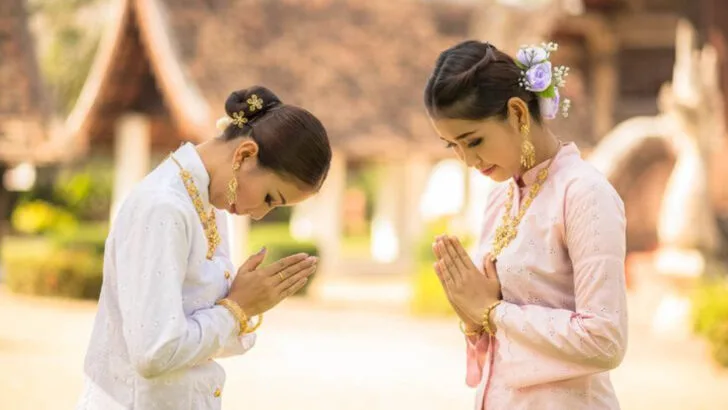Traveling Thailand isn’t just about ticking off temples and beaches — it’s about slipping into a rhythm that locals live by every day. Want to blend in, avoid awkward moments, and truly feel like you belong? There’s a secret code to follow. From how you greet strangers to what you wear in sacred spaces, these unwritten rules will turn you from tourist to temporary insider. Get ready to navigate bustling markets, tranquil temples, and lively street food scenes with confidence and respect. Thailand isn’t just a place to visit — it’s a world to experience like you’re part of it.
Don’t Touch People’s Heads
Respect is paramount in Thai culture. The head is seen as the most sacred part of the body, so touching it can be highly offensive. This belief extends to everyone, including children. When in Thailand, always be mindful of this cultural norm to show respect. It’s not merely about tradition; it’s about understanding a belief that is deeply entrenched in Thai society. Think of it as a way to bridge cultural gaps and foster genuine connections. Whether in bustling Bangkok or serene Chiang Mai, this rule remains constant. Embrace it and enjoy a more harmonious trip.
Always Take Off Your Shoes
In Thailand, shoes are synonymous with the dirt of the streets. Removing your shoes before entering homes, temples, and some shops is a sign of cleanliness and respect. This gesture is a form of acknowledgment and appreciation for the host or establishment. Imagine stepping into a home that’s a sanctuary from the bustling world outside. By leaving your shoes at the door, you’re not just following a rule; you’re accepting an invitation to experience Thai hospitality authentically. It’s a simple but powerful way to blend in and show that you respect local customs.
Smile — Even When You’re Frustrated
Known as the Land of Smiles, Thailand cherishes a pleasant demeanor above all. Smiling, even in frustrating situations, is a cultural norm that reflects patience and understanding. This attitude can transform potential conflicts into amiable exchanges. Imagine navigating bustling markets or crowded streets with a smile on your face; it disarms tension and promotes goodwill. It’s not just about avoiding confrontation but about embracing a cultural attitude that values harmony and kindness. Every smile shared is a step towards experiencing the true essence of Thai hospitality.
Don’t Point Your Feet at People or Sacred Objects
Feet, considered the lowliest part of the body, should never point at people or sacred images. This belief is especially important in temples or when near monks and Buddha statues. Visualize an ancient temple, where serenity reigns and respect is palpable. Adhering to this rule is about more than mere compliance; it’s about showing reverence for Thai spiritual beliefs. Whether sitting or standing, being conscious of your feet’s direction is a subtle but significant way to demonstrate respect and understanding.
Cover Up at Temples
Modesty in clothing is essential when visiting Thai temples. Exposed shoulders or short skirts are considered disrespectful. Dressing appropriately is a sign of respect for the sacred space and its spiritual significance. Imagine a tranquil temple visit where you blend seamlessly into the serene environment. By covering up, you’re not just following a guideline; you’re honoring a tradition that values reverence and contemplation. It’s an opportunity to engage with the spiritual heart of Thailand respectfully.
Show Respect for the Monarchy
The Thai monarchy is revered, and speaking negatively about it is not just rude — it’s illegal. Standing during the national anthem and avoiding jokes or negative comments show that you respect this cultural cornerstone. Picture a society where loyalty and reverence for the royal family are deeply ingrained. By observing this rule, you’re aligning yourself with a tradition that values respect and national pride. It’s more than a legal requirement; it’s a gesture of cultural sensitivity and understanding.
Don’t Raise Your Voice
In Thai culture, loud voices are seen as a sign of aggression and loss of control. Maintaining a calm, soft-spoken demeanor reflects maturity and respect. Imagine navigating a colorful market without the need to raise your voice; it’s about fostering harmony and reducing tension. By embracing this gentle communication style, you can engage more effectively with locals and demonstrate genuine respect for Thai cultural norms. It’s a way to ensure your interactions are both pleasant and productive.
Be Polite to Street Vendors
Bargaining is common in Thailand, but it should remain friendly and courteous. Politeness goes a long way, and a smile can make negotiations enjoyable rather than confrontational. Visualize a bustling market filled with vibrant colors and intriguing scents, where each interaction is an opportunity to connect. By approaching vendors with respect and a smile, you’re not just seeking a better price; you’re fostering goodwill and making the experience enjoyable for both parties. It’s a cultural exchange as much as a transaction.
Don’t Climb on Buddha Statues
Climbing on Buddha statues is a major offense in Thailand. These images are sacred and should be treated with the utmost reverence. Even small replicas sold as souvenirs hold spiritual significance. Imagine a peaceful temple garden where each statue represents centuries of spiritual devotion. Respecting these sacred objects is about acknowledging the deep spiritual heritage of Thailand. It’s not merely about following a rule, but about engaging with a culture that holds its spiritual symbols in high esteem.
Keep PDA to a Minimum
Public displays of affection are frowned upon in Thai culture. Holding hands is acceptable, but kissing and groping in public clash with conservative values. Visualize walking through a lush park, hand in hand, where subtlety speaks volumes. This unwritten rule is less about restriction and more about respecting societal norms. By keeping affection minimal in public, you’re aligning with a cultural preference for privacy and decorum, allowing you to engage warmly without crossing boundaries.
Don’t Touch Monks (Especially if You’re a Woman)
Monks hold a significant place in Thai society, and there are strict rules regarding interactions, particularly for women. Physical contact with monks is generally avoided to respect their spiritual commitments. Imagine a temple filled with tranquility, where monks move with purpose and grace. Observing this rule ensures you respect their way of life and the cultural beliefs they represent. It’s not merely about keeping distance but about acknowledging the profound spiritual path of the monks and respecting their dedication.
Always Say “Khap” or “Kha”
These polite particles transform ordinary conversations into expressions of respect in Thailand. “Khap” for men and “Kha” for women add a layer of politeness to almost every sentence. Picture a vibrant street market where each exchange is marked by these respectful additions. By incorporating “Khap” or “Kha” into your interactions, you’re not just following etiquette; you’re embracing a fundamental aspect of Thai communication. It’s a small but meaningful way to show respect and build rapport with locals.
Don’t Assume Everyone Speaks English
While English is common in tourist areas, it’s not universal. Assuming everyone speaks English can be seen as disrespectful. Learning a few basic Thai phrases shows respect and effort. Imagine the appreciation on a local’s face when you greet them in their language. This effort is about more than communication; it’s a gesture that bridges cultural divides. By learning the basics, you’re not just enhancing your travel experience; you’re showing a willingness to engage with Thailand on its terms.
Follow Scooter Etiquette
Thailand’s roads are dominated by scooters, and etiquette on them is crucial. Wearing a helmet, following traffic flow, and avoiding abrupt maneuvers signify respect for local traffic norms. Picture yourself navigating through vibrant streets on a scooter, where adherence to these unspoken rules ensures safety and respect. It’s not just about following traffic laws; it’s about integrating into the local scene with mindfulness and care. Observing scooter etiquette is a blend of cultural respect and personal safety.
Respect the Pace
Life in Thailand often moves at a slower pace. Rushed service or demanding efficiency can clash with local norms. Embracing the slower tempo allows you to appreciate the culture more deeply. Imagine a leisurely meal where every moment is savored. Respecting this pace is about more than patience; it’s about tuning into the rhythm of Thai life. By aligning with this slower pace, you’re not just observing a custom; you’re immersing yourself in a lifestyle that values presence and enjoyment.
Respect the Quiet in Public Transit
In Thailand, embracing tranquility during public transit rides is key. Buses and trains often serve as quiet retreats from the bustling streets. Travelers might notice the absence of loud conversations or phone calls. This calm ambiance offers a chance to reflect or enjoy the journey in peace.
Adopting a quieter demeanor respects fellow passengers who might be resting or contemplating their day. It’s a small gesture that enhances the traveling experience, aligning with the local cultural norm of maintaining public harmony.
Did you know? Thais value personal space and serenity, even in crowded settings, appreciating when visitors do the same.

